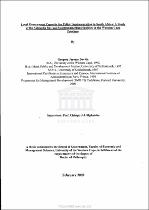Local Government Capacity for Policy Implementation in South Africa: A Study of the Saldanha Bay and Swellendam Municipalities in the Western Cape Province
Abstract
Local government in South Africa is an autonomous policy implementation arm of the government system. The purpose of this study was to examine the institutional, organisational, and human resource capacity challenges the Saldanha Bay and Swellendam Municipalities in the Western Cape faced in their policy implementation especially on poverty alleviation. The objectives of the study were to develop a theoretical framework for examining institutional, organisational and human resource capacity in the Saldanha Bay and Swellendam Municipalities; to discuss the local government constitutional, legislative and policy framework within which the Saldanha Bay and Swellendam Municipalities delivered services to communities; to examine the capacity challenges in the service delivery of the Saldanha Bay and Swellendam Municipalities and, thereby, highlight operational problem areas; and to make general policy recommendations on the basis of the research findings of the study. The methodology used was the case-study approach. It allowed an in-depth understanding of the dynamics present within Saldanha Bay and Swellendam municipality. The methodology enabled the researcher to answer the research question: In what ways, and with what results has institutional, organisational and human resource capacity affected service delivery in the Saldanha Bay and Swellendam Municipalities in the Western Cape? The major findings of the study were that local government capacity for policy implementation is directly influenced by the presence or otherwise of institutional, organisational and human resource capacity. These dimensions of capacity are mutually inclusive, independent and interrelated in practice. The study makes several policy recommendations. In the area of institutional capacity the recommendations were that floor-crossing legislation and practices must be done away with; that weak capacitated municipalities ought to be alleviated by public - private partnerships as a mechanism to enhance a municipality's ability to
develop and implement policy; and that instead of solely setting standards and monitoring performance, the provincial treasury should assist municipalities to acquire financial competencies. In the area of organisational capacity it was recommended that the community ought to participate in the recruitment and selection committee of the Municipal Manager. It was also recommended that municipalities should establish district-wide forums for financial heads whose purpose would be to create a platform for collaboration, and for the exchange of ideas. And in the area of human resource capacity it was recommended that district municipalities ought to assume a more prominent role in building the capacity of the local authorities with which they share legislative and administrative powers. It was also recommended that both the administrative and political leadership ought to participate in compulsory executive and/or leadership training programmes SALGA
implements through some tertiary educational institutions and/or through private service providers.

